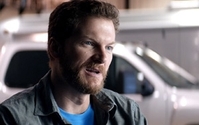 The University of Pittsburgh Medical Center is launching a national and regional digital and TV campaign to promote its Sports Medicine Concussion Program (UPMC), a stand-alone clinic
dealing with sports-related brain injury. The message is that while symptoms are sometimes non-specific, and the injury undetectable by MRI or radiology, one can get full recovery with the right
therapy.
The University of Pittsburgh Medical Center is launching a national and regional digital and TV campaign to promote its Sports Medicine Concussion Program (UPMC), a stand-alone clinic
dealing with sports-related brain injury. The message is that while symptoms are sometimes non-specific, and the injury undetectable by MRI or radiology, one can get full recovery with the right
therapy.
The effort, which includes a national TV spot, brings in UPMC patients NASCAR great Dale Earnhardt Jr., and Major League catcher David Ross, who tell their stories
in separate videos. Ross' video will air on regional TV, and Earnhardt, Jr.'s will be national. The two videos, plus other testimonials are also central to a digital component. Each participated in
the spots without compensation.
advertisement
advertisement
The digital component at ReThinkConcussions.com delves into concussion issues, symptoms, risks and treatment. The center, which has been open since
2000, says it treats more sports-related concussions than any other program nationally with 17,000 patient visits per year.
In one video, Earnhardt is consulting with Collins after multiple crashes in 2012, which had stalled his career. “The best decision I made was to
go to UPMC,” he says. Ross had two brain injuries last year that damaged his playing ability and gave him a labile
personality that put his domestic life on edge. “Without [the program], I would not be a baseball player anymore. They saved my career.”
Other professional athletes who
are, or will be, featured in the ReThinkConcussions.com initiative include former NFL quarterback Brady Quinn, Major League second baseman Brian Roberts and Tyler Hansbrough of the NBA, among others.
The clinic says the effort will also feature others, including recreational, amateur, and high school athletes.
According to CDC stats through 2010, while traumatic brain
injury (TBI)-related deaths have plummeted since 2007, the number of reported concussions have spiked at the same rate. The American Association of Neurological Surgeons says that while death from
sports-related injuries is low, TBI is the prevalent cause.
Although the media focus has been on football and the NFL, cycling is number one by far, with nearly twice the
number of concussion events than football, per 2009 data. The Association, using Consumer Product Safety Commission numbers, says in that year there were 446,788 sports-related head injuries treated
at U.S. hospitals. But the organization also says it's likely the numbers are much higher because the long-tail of products with 1,200 injuries or less are excluded; and a lot of head injuries aren't
treated in hospitals.